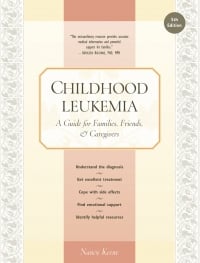Childhood Leukemia
Sibling Grief
Siblings are sometimes called the forgotten grievers, because attention is typically focused on the parents. Children and teens sometimes hesitate to express their own strong feelings in an attempt to prevent causing their parents more distress. Indeed, adult family members and friends may advise the brothers and sisters to “be strong” for their parents or to “help your parents by being good.” These requests place a terribly unfair burden on children who have already endured months or years of stress and family disruption. Siblings need continual reinforcement that each of them is an irreplaceable member of the family and that the entire family has suffered a loss. They have the right, and need, to mourn openly and in their own way.
Children express grief in many ways. Some children develop physical symptoms, such as stomach aches, a loss of appetite or voracious eating, or changes in sleeping or toileting habits. Many younger children regress; they may revert to diapers or baby talk, stop walking, or stop talking. Fears and phobias, such as a fear of the dark or of being alone, are common responses to loss. Children may develop unpredictable or disruptive behaviors, such as tantrums, crying, sadness, anxiety, withdrawal, or depression. Older children and teens may appear nonchalant, angry, withdrawn, or engage in risky behaviors, such as sexual promiscuity, alcohol abuse, and drug use.
Parents should engage siblings of different ages at their appropriate developmental levels. Private time together, or individual outings with the parents, can be very helpful for siblings.
The family requires such reorganization after a child’s death, and there is nowhere to look for an example. Each person in the family constellation has different feelings and different ways of grieving; there is just no way to reconcile all of this when the supposed leaders of the group are totally out of it. Not to mention the fact that both my husband and I wanted more understanding and compassion from each other than we were possibly able to give.
Some parents worry that if they start talking about their feelings, they will break down in front of the children. But the children know their parents are grieving and it hurts them to feel excluded. They are grieving, too, and if they see their parents pulling away from them, they are likely to feel that their parents don’t love them as much as they loved the child they lost. Here are suggestions from families about ways to pull together while mourning:
- Let the siblings go to the funeral. They have suffered a loss; they need to say good-bye and they need support for their grief just as much as adults do.
I grew up going to my relatives’ funerals. Having those positive experiences really helped me deal with the loss of my son. There is nothing more natural than to take a child to the funeral, where they are part of families loving each other, crying together, and laughing at some of the memories. Too many people try to protect kids from death, and it does them a great disservice.
- Children and teens experience the same feelings as adults. Sharing your feelings can encourage them to identify their own. (For example, “I’m really feeling sad today. How do you feel?”)
- Jointly discuss how holidays and anniversaries should be observed. Each family devises different ways to handle holidays, the child’s birthday, and the anniversary of her death.
Last year we marked our first Christmas since Matthew’s death. It was so incredibly hard for me to open the boxes of decorations knowing that inside I would find treasures he had made for me over the years with his own two little hands. I cried when I found his stocking, because I didn’t know what to do with it. Somehow it didn’t seem right to not hang it as usual.
I decided that I would continue to place Matthew’s stocking beside David’s and Kristina’s. Instead of Santa filling it with treats, I asked my family to fill it for me. A few weeks before every Christmas, I ask members of my family to write a memory of Matthew on a piece of paper. The only stipulation is that it must be a happy memory. On Christmas morning, I look forward most of all to the gifts my children have made for me in school, and the memories that fill Matthew’s stocking.
Table of Contents
All Guides- Introduction
- 1. Diagnosis
- 2. Overview of Childhood Leukemia
- 3. Acute Lymphoblastic Leukemia
- 4. Acute Myeloid Leukemia
- 5. Juvenile Myelomonocytic Leukemia
- 6. Chronic Myelogenous Leukemia
- 7. Telling Your Child and Others
- 8. Choosing a Treatment
- 9. Coping with Procedures
- 10. Forming a Partnership with the Medical Team
- 11. Hospitalization
- 12. Central Venous Catheters
- 13. Chemotherapy and Other Medications
- 14. Common Side Effects of Treatment
- 15. Radiation Therapy
- 16. Stem Cell Transplantation
- 17. Siblings
- 18. Family and Friends
- 19. Communication and Behavior
- 20. School
- 21. Sources of Support
- 22. Nutrition
- 23. Insurance, Record-keeping, and Financial Assistance
- 24. End of Treatment and Beyond
- 25. Relapse
- 26. Death and Bereavement
- Appendix A. Blood Tests and What They Mean
- Appendix B. Resource Organizations
- Appendix C. Books, Websites, and Support Groups

